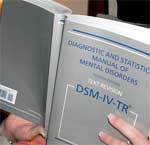Anorexia Diagnosis
 According to the most current edition of the Diagnostic and Statistical Manual of Mental Disorders (DSM-IV) there are four criteria that must be present to achieve an Anorexia Diagnosis.
According to the most current edition of the Diagnostic and Statistical Manual of Mental Disorders (DSM-IV) there are four criteria that must be present to achieve an Anorexia Diagnosis.
Four Criteria for Anorexia Diagnosis
First for an anorexia diagnosis a person must refuse to maintain body weight over a minimal normal weight for age and height or failure to make expected weight gain during a period of growth, leading to a body weight 15% lower than expected.
Second in an anorexia diagnosis, the person must experience intense fear of gaining weight or becoming fat, even though underweight.
Third in an anorexia diagnosis, the person must have a disturbance in the way his or her body weight, size, or shape is experienced and experience undue influence of body weight, or shape on self-evaluation, or denial of the seriousness of the current body weight.
Finally for an anorexia diagnosis, in postmenarchal females (females old enough to have had their first period), amenorrhea must be present. Amenorrhea is the absence of at least three consecutive menstrual cycles when otherwise expected to occur.
Although these criteria for an anorexia diagnosis may appear to be straightforward, they have recently become somewhat controversial. The DSM-IV is undergoing revisions and the latest suggestions include a proposal to eliminate amenorrhea as a criterion. This is because, according to the current diagnostic definition, only females could ever achieve a diagnosis of anorexia nervosa because males will never menstruate.
It is important to note that regardless of the official anorexia diagnosis, both men and women can experience an eating disorder that in practical terms presents as Anorexia. Although an eating disorder may be classified instead as Eating Disorder Not Otherwise Specified (EDNOS) if it doesn’t meet the specific diagnostic criteria for Anorexia Nervosa, it may in effect be equivalent for all intents and purposes.
Related Articles
- Anorexia Nervosa
- Anorexia Causes
- Anorexia Effects
- Anorexia Symptoms
- Anorexia Treatment
- Anorexia Support
- Anorexia Recovery
- Anorexia Statistics
- Anorexiasurvivalguide: Anorexia Diagnosis
- Mayo Clinic: Anorexia Diagnosis
- Athealth: Anorexia Diagnosis
- Anorexia Diagnosis at Wikipedia
 Eating Disorder Self Test. Take the EAT-26 self test to see if you might have eating disorder symptoms that might require professional evaluation. All answers are confidential.
Eating Disorder Self Test. Take the EAT-26 self test to see if you might have eating disorder symptoms that might require professional evaluation. All answers are confidential.